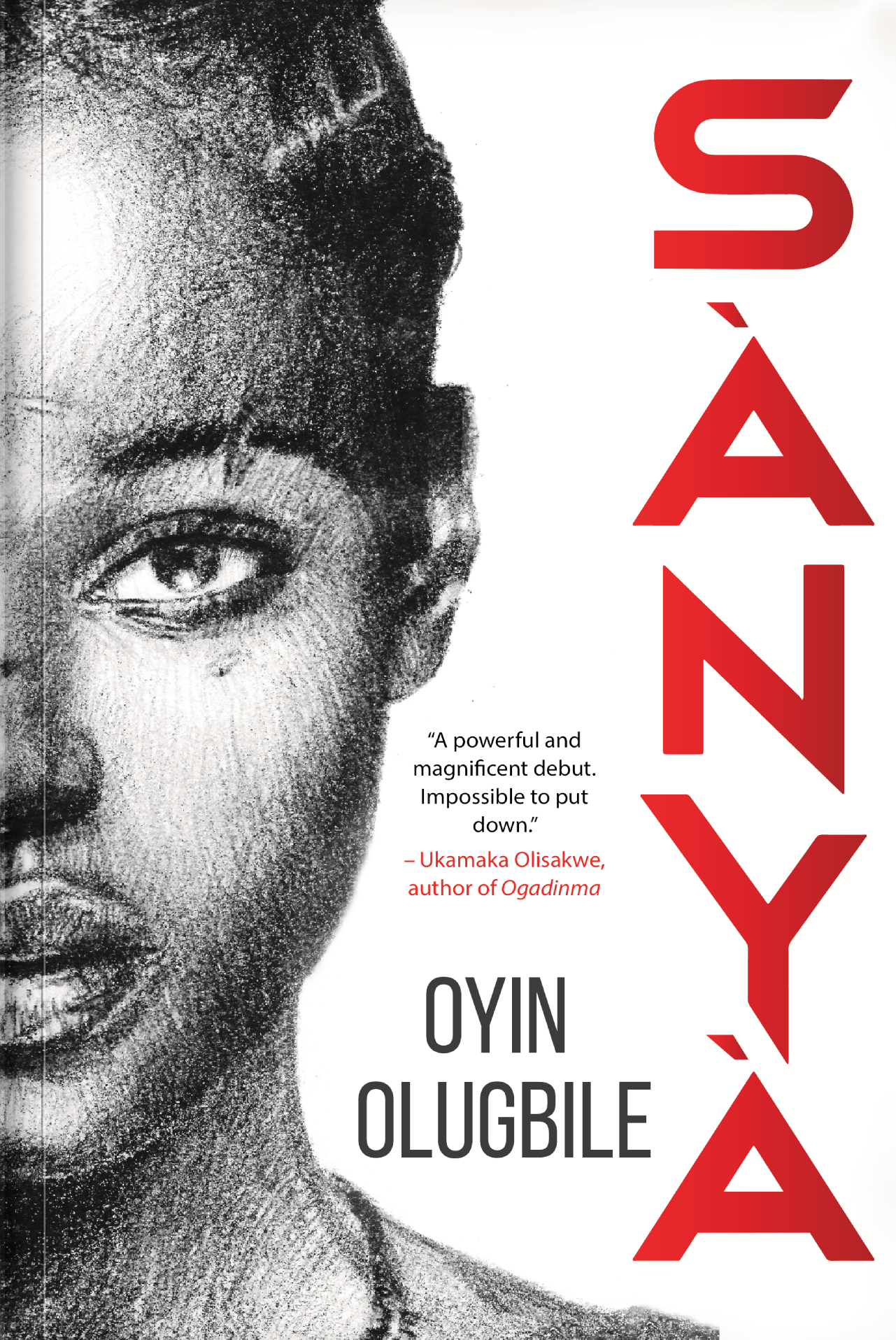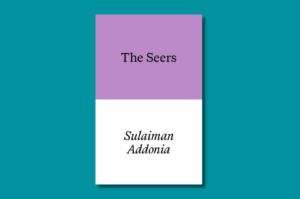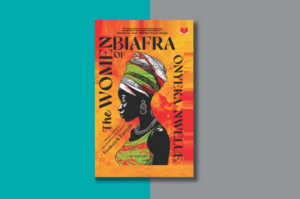Aganjú’s Love
A few hours later, Aganjú entered the hut with a calabash. The bowl was balanced delicately in his hands, and steam from the hot liquid within it spiralled into the air as he placed it on a wooden stool. Àjọkẹ́ had fallen asleep beside Dàda, exhaustion apparent in her sprawled limbs and her mouth hung open. Aganjú paused, saddened afresh to see what had become of the beautiful woman he married. Sorrow and worry had dimmed the lustre of her skin and her clavicles were ringed by hollow wells, a marked contrast to how plump she was only months ago.
He had met her at the village square during the New Yam festival. In a fleeting moment after his gaze fell on her, Aganjú knew he’d make Àjọkẹ́ his bride. Like a peacock in a garden of hens, her beauty stood out among that of the maidens that attended the event. Her skin, glistening with the sheen of palm kernel oil, radiated in the sunlight. The cornrows on her head were thick, lustrous and full, and their curly ends twined sensuously around her nape. Aganjú couldn’t look away from her striking face, the way her hips moved when she walked, and the bouncing strings of beads that lined her small waist. Even while he talked with other young men, his eyes followed her around, drawn to her beauty.
Àjọkẹ́, on the other hand, had first marvelled at the large tubers of yam that Aganjú presented for the yams display contest. Year after year, Aganjú stole the show at the festival. It was little surprise that he once again bagged the prize as it was said that his hands were blessed by the gods. At that time, Aganjú was just beginning to come into his own, gaining a reputation as one of the most successful farmers in Bánirẹ́, with a gift for coaxing the best out of the earth. His crops always yielded massive harvests and the lands his family bequeathed to him had become farms that were always lush with greenery and luscious fruit. When villagers would buy a tuber of yam to find that it was unfailingly sweet, white, and melted in the mouth, they would declare it to be from Aganjú’s farm. Traders hustled to buy and sell his produce and the fruit of his hand work was always in high demand.
When Àjọkẹ́ eventually noticed that the handsome winner had eyes only for her, she was too shy to meet his gaze. As a trader herself, she knew all about the great farmer called Aganjú, and had often giggled with other young ladies over how handsome he was when they visited his farms to buy his produce. But their paths never crossed before that day, and he had definitely paid her no notice.
For whatever reason, that day, whenever their eyes met across the crowded village square, Àjọkẹ́’s stomach would flutter and Aganjú’s heart would race. It was almost as though everyone else at the New Yam festival ceased to exist. While the dancers danced, the children played, and palm wine flowed, they remained keenly aware of each other. It was a love-at-first-sight experience and Aganjú didn’t hesitate to trail Àjọkẹ́ after the festivities were over.
After several visits to her home and many endearing roadside conversations, he professed his intentions to marry her at the Olókun stream, and she accepted his proposal without hesitation. It marked the beginning of a love story that became the subject of village gossip because like a tortoise and its shell, they had become inseparable. They were seen almost everywhere together, holding hands, talking about everything under the sun and what they imagined was beyond it. Àjọkẹ́ became the envy of other maidens in the village, most of whom had silently hoped to be chosen as Aganjú’s bride.
He was the man that every woman in Bánirẹ́ wanted to marry. He had uncommon good looks—a chiselled jawline, expressive, sultry eyes and a delectable mouth. That he also happened to be prosperous and of royal stock made him one-of-a-kind. The village maidens had long drooled over his skin that gleamed like a starry night, his sturdy chest and muscular frame. His smile made them giggle like excited teenagers and they would constantly try to outdo one another to get his attention, but he never again gave them a second glance after he met Àjọkẹ́.
As their love deepened, so did the envy. Àjọkẹ́’s rivals could not hide their disdain whenever she showed up at the village stream to do her laundry. They would sing scornful songs and let out long hisses to express their disgust at Aganjú’s choice. But she would ignore them, secure in the cocoon that was her lover’s affection.
Unlike Aganjú’s, Àjọkẹ́’s family was a humble one. She was the daughter of late Àkàndé, a common blacksmith of no known pedigree. Her rivals and Aganjú’s family were distressed that he would stoop so low. Why would Aganjú choose the daughter of a pauper? After all, he was liked by many other beautiful maidens born of titled chiefs, any of whom would make a good mate for someone with his pedigree. It was a question no one could answer, no one except Aganjú, who seemed captivated by Àjọkẹ́’s beauty and charm.
Despite the hate and disapproval, their love endured, and two months after their first meeting, Àjọkẹ́ became Aganjú’s wife. Though his family would have preferred a daughter-in-law from an elite family, Aganjú’s fervour for his beloved brooked no disagreement. Besides, Àjọkẹ́ soon enchanted them too. Not only was she beautiful, she was gracious and kind. Their families gladly gave their seal of approval and the union was blessed by all, with many prayers, and an abundance of joy. The young couple received numerous gifts: clothes, cookware and finely-crafted furniture. Aganjú’s family also provided a young handmaiden called Abíóyè to help Àjọkẹ́ take care of her home, as befitting her new status as the wife to a man of pedigree.
They began their marital journey with a love intense enough to last an eternity. Their household was happy, and they basked in the afterglow of their unusual love story; a union that defied caste. There was some conflict with Aganjú’s family in the beginning when he finally decided to set his training as a warrior aside and fully commit to his new career as a farmer, so that he could enjoy a simpler and more fulfilling life with his new bride. After a few heated meetings, they grudgingly accepted his decision, and the young man was allowed to settle into his new life of marital bliss. Àjọkẹ́ blossomed under his loving affection, and he never tired of whispering endearments into the curve of her ears whenever they were alone. Their happiness quadrupled when Àjọkẹ́ showed signs of pregnancy in their third month of marriage. She sang praises to the gods who had been benevolent to her new family, and her journey to motherhood began.
Aganjú cared for his bride like she was a cache of hard-mined gold. He refused to let her do any strenuous work and insisted that she let her handmaiden, Abíóyè, do most of the heavy lifting. This did not sit well with Àjọkẹ́ who considered herself strong enough to handle most chores despite her condition. But her complaints did not change anything; rather, they made Aganjú more tender and loving towards her. She became robust as her pregnancy progressed and her skin glowed like precious ornaments exposed to the sun. Every day, Aganjú would lovingly rub oil onto the calabash of her growing stomach and then, her feet, when she couldn’t bend over as easily as before.
Months passed and finally, labour pangs hit Àjọkẹ́ one fateful evening. It started after she had just downed a sumptuous meal that Aganjú prepared for her; pounded yam and vegetable soup, garnished with huge chunks of bush meat. He was massaging her feet and serenading her when her water broke. They stared at each other in astonishment as the water made its way down her thighs and onto the ground. When they got over the initial shock, Aganjú immediately called out to Abíóyè to watch her mistress while he rushed down to fetch the chief midwife of Bánirẹ́, Ọṣumare.
Ọṣumare was in charge of overseeing childbirth for every expectant woman in the village, as well as training other women in midwifery. The position had been conferred on her by the King of Bánirẹ́ after the demise of her mother, who was also the village chief midwife in her time. It was a title that had been long passed down their family lineage. Ọṣumare’s family was revered and slightly feared for the mysterious circumstances that surrounded the midwives. As far back as memory served, each generation of Ọṣumare’s family birthed only one female, who would bear that name and the title of chief midwife, after years of training. Even the males had the gift of healing, and often served as personal healers to kings and chiefs because their skill was unparalleled in the land. According to myth, the family was directly descended from the Òrìṣàs.
After her mother’s passing, Ọṣumare was deemed qualified to carry on her legacy, and serve the community. Since then, she had supervised over twenty deliveries across the village and all of the babies and their mothers remained healthy after birth.
When Ọṣumare arrived at Aganjú’s household in the company of her assistant to perform her duties, she was directed to the birthing hut where Àjọkẹ́ had been transferred to. For centuries, the birthing hut was considered a sacred place in every household. It was usually prepared by the women of a household, and every child born into a family was welcomed into the world in such a birthing hut. Àjọkẹ́ had prepared hers with the help of other women in the village during the early stages of her pregnancy, and after it was completed, she and Aganjú often joked about birthing a total of eleven children in it.
Several hours in, all thoughts of the jokes had now disappeared as Àjọkẹ́’s shrill cries of labour filtered into the ears of Aganjú who was waiting impatiently outside the birthing hut. He was not waiting alone. Other men in the village had come to provide moral support, and also witness the birth of Aganjú’s firstborn.
The men greeted Ọṣumare as she hurried past them for what seemed like the hundredth time. She entered the birthing hut and greeted the women with Àjọkẹ́; older women who had come to observe, and offer support. They paid obeisance to the midwife and backed away to allow her take charge of the situation. After another brief examination of the young woman, Ọṣumare declared that it was almost time. Modúpẹ́, her assistant, had already set the birthing materials close to Àjọkẹ́. She then handed a special calabash to Ọṣumare so she could proceed with the customary rites.
The midwife started by sprinkling sacred water on Àjọkẹ́’s body from her special calabash. Modúpẹ́ and Abíóyè knelt by Àjọkẹ́’s side, using pieces of white cloth to tenderly dab at the beads of sweat which dotted her face. Àjọkẹ́ flinched as the drops of water hit her face, but the coolness brought relief. It was only a temporary respite, as another pang of agony ripped through her again. She screamed as Modúpẹ́ cooed.
“Goddess of ease and fruitfulness, we seek your help again at this crucial time. Let your daughter pass through this birthing phase unscathed,” Ọṣumare intoned.
“Aṣẹ!” The other women in the hut chorused.
“May we hear the cries of the mother and that of the child.”
“Aṣẹ!”
Ọṣumare set the calabash aside and knelt before Àjọkẹ́, who was writhing in pain. She held Àjọkẹ́’s knees apart and urged her to push with all her might.
Àjọkẹ́’s screams of labour sent shivers down Aganjú’s spine as he listened from outside the hut. He longed to be by his wife’s side, to hold her hands and assure her that everything would be alright. But his wish could only remain that—a wish, as it was a taboo for men to enter the birthing hut. Only women were permitted to witness the sacredness of childbirth.
Minutes after the midwife announced the child’s imminent arrival, the loud cries of a baby filled the birthing hut.
“It’s a boy!” Ọṣumare announced to the waiting men outside the hut. Shouts of joy filled the air as the men jumped in glee and congregated around Aganjú to congratulate him on being the newest father in the village. Inside the birthing hut, after the baby was cleaned and positioned to enjoy his first suckle, the women congratulated Àjọkẹ́ with joyful songs to commend her strength and bravery, welcoming her to the world of motherhood.
On the eighth day, the child was named Dàda to the hearing of excited guests and well-wishers. The ceremony lasted the whole day, with plenty of food to eat and enough palm wine to go round.
Aganjú sighed as he recalled the happiness of that time. Indeed, it seemed like the gods had blessed his household, until sickness ravaged his son’s body and Dàda’s failing health became the talk of the village. The stream of happy visitors lessened to a trickle of curious busybodies, and happiness quickly departed from their home. Careless tongues wagged and restless hands clapped as some of the villagers wondered if the mystery child was truly a gift from the gods. Perhaps, they speculated cruelly, the child with the locs would return to where he had come from.
“Àjọkẹ́,” Aganjú called, rousing his wife from sleep reluctantly. He wished he could let his wife rest, as their son’s illness had robbed her of such unguarded moments of slumber. But he could not let the newly-brewed potion go cold, and he would need her help to administer it to Dàda.
Àjọkẹ́ jerked awake and rubbed her eyes.
“The potion is ready,” he announced, pointing at the steaming liquid in the calabash. Àjọkẹ́ looked dejectedly at the calabash. Her doubts were glaring but she bit her lips to hold back the words brimming in her mouth.
“No harm will come to this child. We will nurse him to health,” he assured her.
Àjọkẹ́ nodded and slid off the mat to take a closer look at the potion. She wrinkled her nose at the pungent smell that wafted from the calabash and felt a wave of pity for her baby. The potion would probably taste as bad as it smelled. She could only hope that he wouldn’t spit it up.
When her husband noticed her expression, he sighed in understanding. She always found it distressing to force the unpleasant medicines down Dàda’s throat.
“Bring him,” Aganjú instructed, sitting on the edge of the mat.
Àjọkẹ́ sat beside her husband, and then carried Dàda gingerly, setting him on her lap. With a small wooden spoon, Aganjú scooped small quantities of the brown liquid and cooled it down by blowing on it. Then, as Àjọkẹ́ pressed the sides of Dàda’s cheeks with her thumb and index finger to open his mouth, Aganjú tipped the warm liquid into his mouth. The child was too weak to reject the medicine and only sputtered as the potion went down his throat.
“Gods of our land, please be merciful to us and heal our child. Do not take away our hope. Restore health to our child and make us smile again,” Àjọkẹ́ prayed with her eyes raised upwards.
“Aṣẹ!” Aganjú responded, as he scooped more of the liquid into his son’s mouth.
They lay Dàda on the bed and sat by his side, watching him closely till he fell asleep. Seeing him rest from his discomfort was a huge relief to them and they left the room, careful to be quiet, to prepare dinner before retiring to bed.
Dàda’s cries roused them from sleep a few hours later that night. Aganjú watched in concern as Àjọkẹ́ sat upright and lifted their baby. Instinctively, she shifted her ṣimi aside and pressed her nipple against his mouth. A wave of relief swept over her as Dàda latched onto it like he was starved.
“The gods be praised!” Àjọkẹ́ shouted in delight as tears of joy ran down her cheeks. “He’s sucking!”
Aganjú rubbed his wife’s back, beaming as he watched his son sucking with enough zest to make up for the hours that he had been unable to.
By morning, Àjọkẹ́ had breastfed Dàda three times with joy and enthusiasm. Life returned to the boy and, weeks later, he was once more the bright and bubbly child that everyone knew, only a little less chubby.
The couple paid the healer a visit, bearing gifts to show immense gratitude for the herbs that rescued their son from the jaws of a sickness that had threatened to steal his life away.
Everything went back to normal and life settled back into familiar routines, grateful that the storm had finally passed. Dàda’s restored health silenced the stinging village gossip about his inevitable demise. Once again, their hut welcomed villagers who came to rejoice with the couple for not losing their son to the sickness that shook every fibre of his being. Songs of gratitude were offered to the gods and celebratory dance steps were performed to express their joy for Dàda’s miraculous recovery.
Unfortunately, their newfound happiness was not to last.
***
Sanya will be published on December 7, 2022.
Preorder Sanya: Masobe Books
Excerpt from SANYA published by Masobe Books. Copyright © 2022 by Oyin Olugbile.










COMMENTS -
Reader Interactions